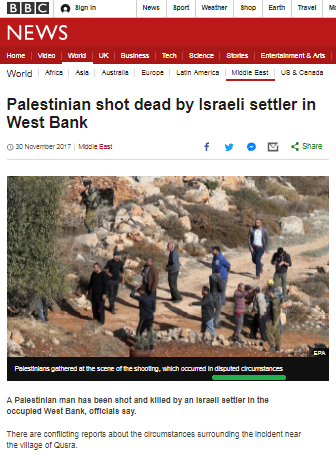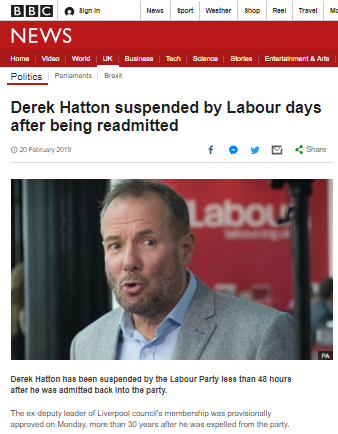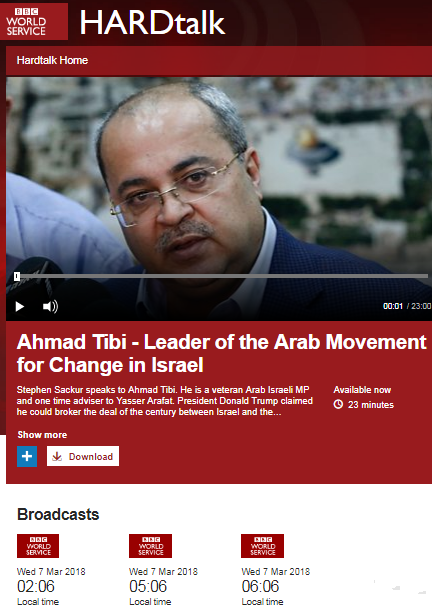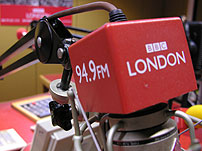BBC television news coverage of the rioting in Shuafat and other districts in Jerusalem after the discovery of the body of Muhammed Abu Khdeir on July 2nd has included two reports from the same day (also promoted on the BBC News website) by the BBC’s Christian Fraser, who was apparently brought in from Paris to provide back up to the Jerusalem Bureau.
The first of those BBC television news reports appeared on the BBC News website’s Middle East page under the title “On ‘front line’ in East Jerusalem as Palestinians clash with police“. Fraser opens:
“Well this is the front line in East Jerusalem. We’re on the Palestinian side. You can see; these young Palestinians are throwing rocks that are littered around the floor. If you just spin round here, Jimmy [cameraman], you’ll see that someone’s just delivered more rocks for this man to throw. Ahm…just up here they’ve built this barricade. In fact in the last few minutes they’ve maneuvered a skip in place to try and give themselves some protection. Because on the other side, on the roofs, there are snipers. There’s a line of Israeli soldiers who have been firing rubber bullets at the Palestinians and in fact media crews have been hit this morning – one Palestinian crew and also one photographer who strayed too close. The air is thick with the smell of burning plastic and over here, right on the front line, is the house of the young boy that went missing this morning. Seventeen years old. His mother Suha told me he disappeared on his way to the mosque, which is over here across the road.”
Fraser’s ‘David and Goliath’ pastiche focuses audience attentions on rock-throwing, failing to clarify that other methods of attack such as firebombs and IEDs were also used by the rioters and making no mention of Palestinians attacked by the rioters or the vandalism of the section of the light rail system serving Shuafat. His description of members of the Israeli security forces engaged in riot control as “snipers” is of course inaccurate and misleading – especially as they are obviously in full view of the camera. He continues with an interview with an unidentified woman.
CF: “I want to just get a feeling of the anger that there is in this Palestinian community. Can I just talk to you? Just come over here. Tell us a little bit about this region ‘cos we’re very close to….”
Woman: “Settlements.”
CF: “To settlements. To an Israeli settlement.”
The “settlements” which Fraser promotes after the woman’s cue are of course Jerusalem neighbourhoods such as Pisgat Ze’ev.
Woman: “Yeah, it’s very bad. All of these guys they are relatives and they are boiling. They can’t want to do…Imagine if this boy he’s Jewish and he’s killed. What can they do they Jewish with us?”
CF: “Hmm..”
Woman: “What they did in Hebron. What they did.”
Fraser then puts his own words into the woman’s mouth:
“As a mother, are you sad that children on both sides are dying in this conflict?”
Woman: “Ehh…it’s not fair but we are, but we are, we like peace, we love peace. But if you – somebody take your house, your land, your kids, what can…imagine what can you do with them. Imagine. This is our life. This everyday. This is our life. This is our life.”
Fraser has nothing to say about the woman’s defamatory portrayal of Israelis as stealers of land, houses and children. Instead, he closes with a description of events which does nothing to inform BBC audiences why a community which might be expected to help the police with their inquiries into the murder of a local boy is instead obliging security forces personnel to engage in full-time riot control.
CF: “As the lady says, this is the cycle of violence; this eye for an eye mentality that in this region can spill out of control.
The same woman interviewee was also featured in a second filmed report by Fraser broadcast later in the day on BBC television news programmes and posted on the BBC News website’s Middle East page under the title “Mother of kidnapped Palestinian: ‘My son wasn’t answering’” with a synopsis which, like many other BBC reports on the topic, irresponsibly promotes an unproven version of events.
“Hundreds of Palestinians have clashed with Israeli police in east Jerusalem after a Palestinian teenager was found dead in a forest.
It is the thought the 17-year-old was kidnapped and murdered in a revenge attack for the deaths of three Israeli teenagers last month.”
Fraser also opens his report with the promotion of a completely unverified accusation.
CF: “Jerusalem forest, where Israeli police recovered this morning the remains of a body: a young man who’d been beaten and set alight. He was Muhammed Abu Khdeir – a seventeen year-old Palestinian schoolboy that neighbours say was kidnapped by Israeli settlers.”
Neither Fraser, nor the anonymous “neighbours”, nor indeed the police investigators currently dealing with the case have so far any proof that Israelis – let alone “settlers” – kidnapped the teenage boy. And yet the BBC has no qualms about broadcasting that speculative rumour to millions of viewers and readers around the world.
Unlike Fraser and his BBC crew, an Israeli journalist specializing in Arab affairs did go to enquire about the basis for those claims by “neighbours” that “settlers” had kidnapped the boy.
“Were they wearing kippot? I asked the family members; they answered that they weren’t. Did they have beards, tziziot [fringes]? No. What are settlers? I asked and came up against unclear answers. ‘They escaped to Jerusalem, so they’re settlers’ they answered at the end of the short interview….”
Fraser continues:
“His home is in East Jerusalem and it now marks a makeshift front line in the running battles with Israeli soldiers. Inside the house; the grieving relatives. Among them, Muhammed’s mother Suha who had the grim task of identifying her son in a police morgue.”
Mother: “They told me someone was kidnapped on the way to the mosque. I called his phone. I kept calling and calling. It was switched off. My son wasn’t answering.”
The BBC’s ‘style guide’ defines ‘Palestinian territories’ as follows, but Fraser seems to have concluded that certain neighbourhoods of Jerusalem which are not of course under the control of the PA, can also be described as such.
“Strictly speaking, the phrase ‘Palestinian Territories’ refers to the areas that fall under the administration of the Palestinian Authority (above). These are complicated to work out because of the division of the West Bank into three areas and because of the changes on the ground since the Intifada.”
CF: “The confrontations with soldiers are an everyday part of life in the Palestinian territories. They’ve seen it many times before. But there’s nothing normal in this: young men risking lives throwing stones in the direction of snipers.”
There’s that inaccurate description of riot control police as “snipers” yet again promoted to BBC audiences, along with a bizarre framing of the rioters as some sort of heroic figures “risking lives”. Next the unnamed woman from Fraser’s previous report makes a reappearance.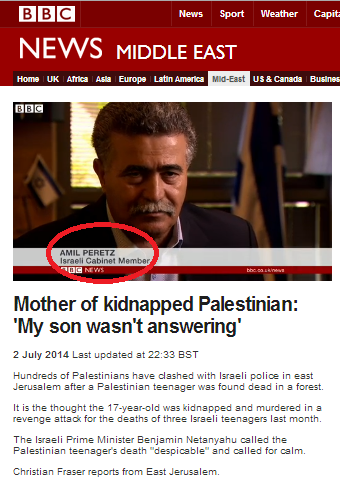
Woman: “It’s bad. Our situation is very bad. It’s very bad. All of these guys they are relations and they are boiling.”
Fraser then goes on to make the very dubious claim that riot control police attacked the family’s house.
“The patience is wearing thin on all sides. Suddenly the house becomes the focus of a sustained Israeli assault. Stun grenades, rubber bullets, pandemonium. The relatives of the murdered boy take shelter.”
Fraser continues by making the unjustified and inaccurate implication that there may be some sort of difference in the way this incident is being handled because of the boy’s ethnicity.
“This is the cycle of violence; that eye-for-an-eye mentality that in this region can quickly spiral out of control. The Palestinian anger is underpinned by the feeling on their side that their lives are worth less, so it’s incumbent on the Israeli authorities that they condemn and pursue the perpetrator of this crime as they would had it been an Israeli child.”
He goes on to relate to the three boys kidnapped and murdered on June 12th, notably with the introduction of a caveat regarding the perpetrators despite – in that case – the evidence available.
CF: “Of course earlier in the week it was an Israeli child. Three of them: abducted and murdered – say Israel – by Hamas.”
Next comes an interview with an Israeli minister inaccurately named as “Amil Peretz” in the sub-titles.
CF: “But this cabinet minister told me he considers today’s murder every bit as abhorrent.”
Amir Peretz: “It shames our country and if it is proven to be Israelis who are responsible, then I would consider it a terrorist attack.”
Fraser concludes:
“A resumption of the peace talks then looks as distant as ever. There are ten standoffs continuing in East Jerusalem, in the West Bank. Mortars were fired today from the Gaza Strip. Tomorrow, it’s the funeral.”
If Christian Fraser or anyone else at the BBC has actual evidence to suggest that “Israeli settlers” were responsible for the murder of Muhammed Abu Khdeir, they should of course contact the Israeli police immediately. If they do not, then Fraser and others should clearly cease the propagation of speculation and rumour which has been evident in all BBC reporting on this topic since the first hours of the incident and start behaving like journalists from an organization committed to accurate and impartial reporting.
Related Articles:
BBC News promotes unverified speculation on motive for killing of Palestinian teen

